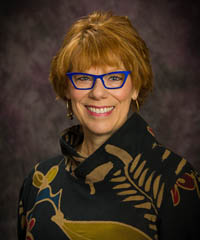August 5, 2019
Historic costume and textile museum curator named professional reviewer for Hometown Treasures program
Submitted by College of Health and Human Sciences

Marla Day, historic costume and textile museum curator, has been named a professional reviewer for the Hometown Treasures program.
The Smithsonian's National Museum of African American History and Culture hosts the Hometown Treasures program. It looks to stimulate preservation activity nationwide, preserving objects of historical and cultural significance, identifying potential collections for the museum, and developing collaborations among cultural institutions and communities across the country.
Day will serve as a professional reviewer of textile items during the Save our African American Treasures event in Denver, Colorado, alongside Nancy Love, textile conservator in private practice, and Renee S. Anderson with the Smithsonian Institution. The event allows community members to bring up to three items and meet with the reviewers for a 15-minute session. The reviewers will help place the object(s) in historical context and provide them with advice on how to care for the items displayed. The reviewers will not provide a monetary value to items but the event will provide a list of local appraisers and resources.
This is Day's sixth time participating as a reviewer for the program. She has traveled to Detroit, Dallas, Birmingham, New York City, Topeka and Houston where she reviewed a large number of quilts and crocheted pieces, a few dolls and clothing. One particular object that she was thrilled to evaluate for a participant was a Black Sox uniform, a professional baseball team from Baltimore than won the American Negro League championship in 1929.
"The goal of the Treasures program is to help people learn how to care for their family's heirlooms, document their family stories that relate to that object in order to inspire current and future generations to hold onto these objects," Day said. "We can help them see unique features about their heirlooms by carefully studying and noting the details. These fresh insights and observations help them to understand how difficult or challenging it was to create an item, or to see in the wear patterns and patches from use, maker's marks, or the unnoticed little details of how it was made or when.
"It is up to each generation to spark curiosity about one's ancestors and family heirlooms," Day said. "If we don't honor these objects by keeping them safe, document what stories they hold, and share these at family gatherings, the cultural heritage of that object will be lost."
Day has been involved with the Historic Costume and Textile Museum, housed in the apparel, textiles, and interior design department in the College of Health and Human Sciences, since 1998. She was named curator in 2004. The museum is a notable collection of traditional and artistic artifacts, with more than 15,000 pieces. The collection began in the 20th century and continues to be augmented by friends, faculty and Kansas State University alumni who have lived and traveled throughout the world. More information on the museum can be found on its website.
To learn more about Save our African American Treasures, visit the event website.
